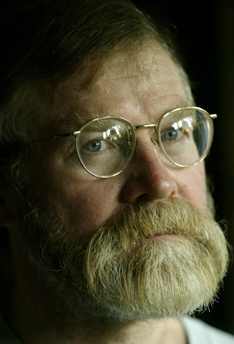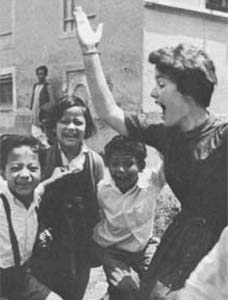
Tom Johnson of Morristown 'accidentally' ended up in a medical and surgical relief effort in the village of Masongbo, Sierra Leone, where he served in the Peace Corps before the civil war
Morristown man brings medical aid to Sierra Leone
By Ellen Wilkowe, Daily Record
Tom Johnson of Morristown is no doctor, but to the 2,000 villagers in Masongbo, Sierra Leone, he's something of a miracle maker.
The 53-year-old handyman has several keepsakes from grateful villagers, including a paramount chief's fan, and has even received several chickens - a Sierra Leonean's form of gratitude.
"I dropped off some prenatal vitamins at a clinic and they gave me this," he said, waving the red, white and blue striped, paddle-shaped fan with loose red fringes. "It's a big compliment. In their political system, a paramount chief is like a mayor of a village."
He may as well be.
Johnson has found something of a second home and purpose in this Western African nation where tuberculosis (TB), Pott's disease (TB of the spine), polio and malaria run rampant. He has stepped forward to recruit doctors for surgical and medical assistance.
It happened accidentally.
Johnson was stationed in Masongbo as a member of the Peace Corps from 1989 to 1991. He assisted in agricultural development and beekeeping, a hobby he started at home 10 years ago because of his love of honey.
His medical mission started with his beekeeper friend and "Sierra Leone counterpart," Ahmed Tarawali, whom he went to visit in January 2002. A mutual friend, Abu Kaloko, suffered a hernia from operating a large hoe on someone's farm.
"I left some money with Ahmed and told him to have that hernia fixed," Johnson said.
This seemingly passing gesture got the ball rolling. Not only did Kaloko receive assistance from a missionary surgeon at hand, but two others with hernias were able to get help as well.
When Johnson went back to visit his village in December, 80 people showed up with surgical needs, including men, boys and two women.
"I originally returned to my village to help Ahmed start his beekeeping program that had been destroyed during the war," Johnson said. "It was just an accident that we ended up in medical and surgical relief effort."
Sierra Leone is still recovering from a brutal 11-year civil war between the government and rebel forces, which, according to the CIA's World Factbook online, claimed tens of thousands of lives and displaced 2 million natives who sought refuge in neighboring countries.
David Rosen, author of "Armies of the Young: Child Soldiers in War and Terrorism" (Rutgers University Press, April 2005), called Sierra Leone the "poorest nation on the planet." This is despite the country's diamond mining activities.
Rosen, a professor of anthropology and law at Fairleigh Dickinson University in Florham Park, spent several years in the province that became the center of rebel-held activity.
"There were several armed forces. The rebels known as the Revolutionary United Front, or RUF, wanted to control the diamond mines," Rosen said. "Then there was the government-sponsored army, the Sierra Leone army, and the final force, the civilian defense forces made up of local militia from villages and towns who tried to fight off the RUF."
Most of the atrocities and human rights violations were committed by the rebels, who had a hard time finding people to side with them, Rosen said.
"The only strategy they had was to intimidate and terrorize people to send a message that their own government couldn't protect them," he said.
A short cease fire in 1999 broke down when the RUF took 500 United Nations peacekeepers hostage the following May. As of 2000 about 13,000 U.N. peacekeepers have been protecting the capital, Freetown, and the villages in the south.
"Diamonds were discovered in Sierra Leone in the 1930s, and it's the country with the largest gem stones in all of Africa," Rosen said. "Even after their independence from the British colonial government, the situation didn't change that much because the resources are in the hands of cronies."
Rosen said the country is economically worse off than in the '60s or the '90s.
"People are so deeply mired in poverty and there are so few resources," he said. "And you have a government on the edge of legitimacy."
Many natives make their living as sustenance farmers and like Tarawali, the beekeeper, suffered property and land loss from RUF destruction.
The few existing hospitals also were destroyed during the war, Johnson said.
As a result, many surgeries are performed in Ghana by the medical mission team FOCOS (Foundation of Orthopedics and Complex Spine). The not-for-profit foundation was founded by Dr. Oheneba Boachie-Adjei, who practices at the Hospital for Special Surgery in Manhattan.
Funds come through multiple sources, including Assumption Church in Morristown where Johnson is an active member.
Bernice Anglin, a volunteer at Assumption and acquaintance of Johnson's for about eight years, can attest to that.
"Tom does work that few people will or can do - working among the world's most vulnerable who would never find the opportunity of healing that he gives to them," she said. "The fact that he can eat and digest almost anything is a great access to his success."
Also pitching in to the cause, Johnson credits the Knights of Columbus George Washington Council 359 and benefit concerts performed by his Irish band, the Dicey Riley Band. A concert held in April in conjunction with Assumption Church help drum up additional support, as does Friends of Sierra Leone, Randolph High School Key Club and individual members of the Volunteers in Mission team with whom Johnson works repairing a medical clinic.
Spinal surgeries in Ghana cost about $6,000 per procedure, he said. While the doctors operate for free, the hospital charges for its medical services. Johnson said he has paid for some of these fees as well as his own travel expenses, using his own money and whatever money he has raised through family, friends and organizations.
"I'm like an organization within an organization," he said.
Despite other countries' negative views on Americans, Sierra Leone natives overwhelmingly welcome visitors from the West, he said.
"We're like the golden egg to them," Johnson said. "These people are desperate. To them, I am the white man. I have access to guns and airplanes and surgery. I have the power to get things. Therefore, they will do everything to make me love them."
Travel to Sierra Leone takes about 24 hours, including a six-hour stopover in London. Currency is the Leone, which matches the dollar 3,000 to one.
There are no plush hotel accommodations, and Johnson makes himself comfortable at Tarawli's home.
He dines on regional fare such as a bowl of rice with gravy and some cowhide, "an acquired taste," he said, dished out at local chop houses for about 30 cents.
"There are some fast food restaurants there," he said. "And Internet cafes are a big thing now."
Foday Sesay who underwent three corrective surgeries from life-threatening scoliosis spends most of his time at Internet cafes honing his computer skills in hopes of coming to America.
At his home in Morristown, Johnson keeps a before-and-after scrapbook of villagers such as Kanu, who he helped receive treatment. He also records journals of his journeys on his Web site, africasurgery.org.
There's 5-year-old, Hawa Kanu, who was paralyzed but now can run, skip and jump after her surgery in May 2004. There's also Admire Kanu, a girl with a fractured spine brought on by Pott's disease.
"She was about 7 years old at the time," Johnson said. "She eventually lost the use of her legs but having received surgical treatment she can use her legs."
While lack of facilities and medicine drive the disease rates, Johnson said lack of education is equally to blame.
"They may have gotten their first immunization for TB but didn't know to get the second," he said. "Also, their world view is different than ours. They still go to witch doctors or bush doctors."
"Injection doctors," people dressed as doctors who provide colored water injections, were also commonplace in Sierra Leone, Rosen added.
Johnson's next trip is scheduled for July but he's already planning for a big medical relief effort in January.
On Thursday, he successfully recruited two obstetric and gynecological surgeons from Manhattan to work alongside Sierra Leonean surgeons in January. Returning for the third time in the January trip is ophthalmology resident Joe Capriatti of the New York Ear and Eye Hospital, who diagnosed natives with severe cataracts, which if untreated can cause blindness.
"Dr. Joe will be coordinating a cataract surgery program we started in Sierra Leone," Johnson said. "So far we restored vision for 22 natives who had been blinded with cataracts."
To date, 10 people have been sent to Ghana for spinal surgery and there are currently 150 on the waiting list.









